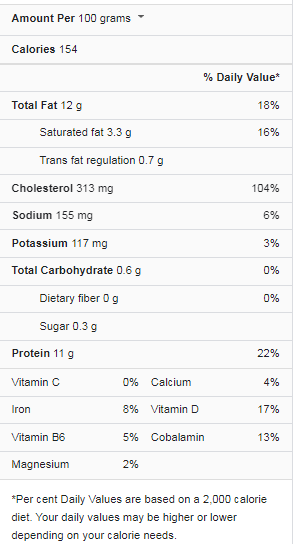An omelet is the most excellent choice for breakfast. They are delicious, filling, and incredibly healthy. The omelet’s myriad health benefits, however, suffice on their own. If you focus your diet too much on foods rich in these nutrients over time, your insulin levels may rise, which can gradually hurt your general health. As long as you eat a well-balanced diet, carbohydrates and starches are generally safe and pleasant. Because of this, selecting a protein-rich meal, such as an omelet, will assist you in consuming less overall and maintaining a balanced system.
Omelette Nutrition Facts
Health Benefits of Omelette
The abundant vitamins and minerals in eggs give your body the energy it needs for the long day ahead. Instead of using refined vegetable oils while making omelets, try using healthy oils like mustard, olive, or coconut. You can stay active all day long because these oils give your omelet better fats.
Source of Protein
One of the most significant advantages of eating omelets is this. The truth is that most of us rarely consume enough protein in our diets, mainly when we eat meals high in grains and carbohydrates. However, you can alter that by including more eggs in your diet.
Omelets Fill you up
You will feel fuller for longer if you eat an omelet for breakfast. Carbohydrate-rich foods only fill you up for an hour or so before leaving you hungry and making you want more. What transpires when you’re hungry, too? You eat more. Additionally, you might eat additional unhealthy snacks if you are hungry between meals. But you may stop these bad habits by simply increasing the amount of protein-rich meals in your diet. You’ll feel more energized and fuller for a more extended period.
Omelets Offer Additional Nutrition
Various veggies rich in vitamins and minerals are frequently included in omelets. Therefore, these breakfast options are considerably healthier for you in the short and long term.
Omelets can Aid with Weight Loss
Eggs and omelets are a terrific choice if you’re looking to reduce weight by eating a healthy diet. Because these meals are high in protein, you won’t overeat or choose unhealthy snack options because your desires will be reduced. Omelets might be a part of your everyday diet if you’re trying to lose weight. Many people think omelets have a lot of calories, but you can manage this. Cook your omelet in better, lighter oils and add extra vegetables.
Make sure you don’t fry the omelet in too much oil. Bread is not necessary to accompany omelets. By doing this, you’ll stop consuming calories and feel fuller. Making sure your omelets are properly seasoned is also crucial. For flavor, sprinkle some cumin, black pepper, or red chili powder over the top. The appropriate seasonings might increase your body’s metabolic rate.
Omelets are Loaded with Nutrients
Eat an omelet to meet your recommended daily vitamin intake! In addition to containing vitamins B, C, D, E, and K, eggs are a fantastic source of vitamin A.
Omelets are Good for Brain Health
Do you know that choline is a substance found in eggs? This substance is said to be excellent for your nerves and brain health. Your brain will improve if you eat omelets made with eggs every day. Kids can enjoy omelets as a delicious breakfast option, giving them the vital nutrients they require.
By topping your omelets with healthy ingredients, you can make them healthier. While making it, add more healthy veggies like bell pepper and spinach, and Chia seeds and flaxseeds are two other nutritious additives.
A substance called choline, essential for preserving the health of your nerves and brain is naturally abundant in eggs. In the long run, you will gain by including more eggs (and omelets) in your breakfast routine.
Is a Boiled Egg Healthier than an Omelet?
Boiling eggs and omelets may be compared without much thought or study because they are identical. The cooking method is where the difference first appears. Depending on how they are used, the nutrients in both types of eggs are essentially the same and don’t differ significantly.
Preparing boiled eggs is simple and does not result in adding calories or fat from cheese or other ingredients. Eggs are cooked in water with their shells for “hard-boiled” eggs. Therefore, hard-boiled eggs are a wise health decision while choosing from the options provided.
The healthiness of omelets relies on how they are prepared. The components used to prepare an omelet will determine its health benefits. Simply adding vegetables improves nutrition and makes ordinary boiled eggs healthier. On the other hand, if we add additional oil, cheese, and bad fat, your lovely omelet becomes your body’s biggest enemy.
How many Omelets can I Eat a Day?
When eating an egg omelet for lunch and dinner to lose weight, stick to one egg per meal to consume a maximum of two eggs per day. According to the USDA, a giant egg has roughly 94 calories, which is more in line with the number of calories appropriate for a snack. Essential vitamins required for the body’s energy supply and immune system are also present in a four-egg omelet. Forty-seven percent of the recommended daily intake of vitamin A, a crucial vitamin needed for bone development and vision.
According to USDA nutrition statistics, a two-egg omelet has 4 grams of saturated fat. Butter, coconut oil, cheese, and red meat all contain significant levels of this type of fat, which is regarded as immoral. Most heart-healthy persons can have up to seven eggs each week without experiencing any adverse effects. Some people opt to solely consume the egg white, which offers some protein without the cholesterol and avoids the yolk.
Is Omelet Good for Skin?
For skin, eggs. Eggs can be used to improve greasy or dry skin texture. Egg whites include albumin, a specific protein that aids in tightening pores and removing excess oil, while egg yolks are rich in fatty acids that can help add hydration to the skin. The hormone progesterone, which causes acne, is abundant in eggs. Since your body produces progesterone on its own, taking more hormones can unavoidably cause your body’s natural hormone levels to fluctuate. High amounts of progesterone may bring on acne. Thus, it is best to monitor your egg intake.
An excess of keratin can be produced in the skin when you take an absurdly high dose of biotin. If left unattended, this may create imperfections. The good news is that eggs don’t have enough biotin content to reduce acne significantly. Egg whites that are still raw run the risk of spreading infection. Pollution on the surface. Egg whites can contaminate surfaces like sinks, countertops, and other locations where the mask might leak and spill throughout the house.
Is Omelet Good for Heart?
Most heart-healthy individuals can have up to seven eggs each week without experiencing an increase in their risk. According to some studies, eating this many eggs may even help against some types of stroke and macular degeneration, a devastating eye ailment that can result in blindness. According to a study, eating omelets daily could harm your heart health. A significant investigation that followed over 30,000 adults for up to 31 years discovered a connection between consuming eggs and an elevated risk of heart disease.
The healthier alternatives include eating boiling eggs, omelets with salt and pepper, salads, and sandwiches with eggs. A person with a heart condition should strictly avoid eating fried eggs since they are overly fatty and may increase their chance of developing heart issues. An NHLBI-funded study found that cardiovascular disease, including heart disease and stroke, among U.S. adults and death from any cause increased with dietary cholesterol or egg consumption.
Do Omelets Taste Different than Scrambled Eggs?
Finally, the food’s mouthfeel, or texture, has a significant role in how flavor is perceived. So this is another reason why fluffy omelet or gooey poached eggs taste slightly different from soft scrambled eggs. Apart from the possibility that you added to milk, oil, or seasoning, one factor that affects taste is whether the egg has been beaten. Combining egg white and yolk will alter the sensory experience because egg white has less flavor than thick, fatty yolk.
A fried egg’s or omelet’s flavor is also altered by browning. The main distinction between an omelet and a scrambled egg is that an omelet is prepared without stirring, whereas a scrambled egg is prepared by mixing it slowly while it is cooking. Different ingredients are added to these dishes from one country to another to boost their nutritional value and flavor. Scrambled eggs are a great choice if you need to prepare a tasty and wholesome snack quickly for yourself or your family. They’re simpler to make than an omelet because fewer things may go wrong.
Conclusion
Try eggs as a high-protein meal if you want something to add to your diet. One of the most well-liked sources of protein is eggs, and your body needs protein to increase strength and ensure muscle and tissue regeneration. A single egg has 6.3 grams of high-quality protein. One of the best breakfast options, omelets are a great source of protein. Additional low-calorie protein sources like feta cheese and cottage cheese can be used to decorate your omelet. Adding cooked chicken bits to the omelet is another smart move.
The variety of veggies used to produce omelets is their best feature. The mix of eggs and leafy greens keeps you full for a long time. Your omelets become healthier and more nutrient-dense by adding vegetables. Additionally, green vegetables provide more fiber to your omelet, extending your feeling of fullness. You won’t overindulge in unhealthy foods or binge on them between meals if you do this.



